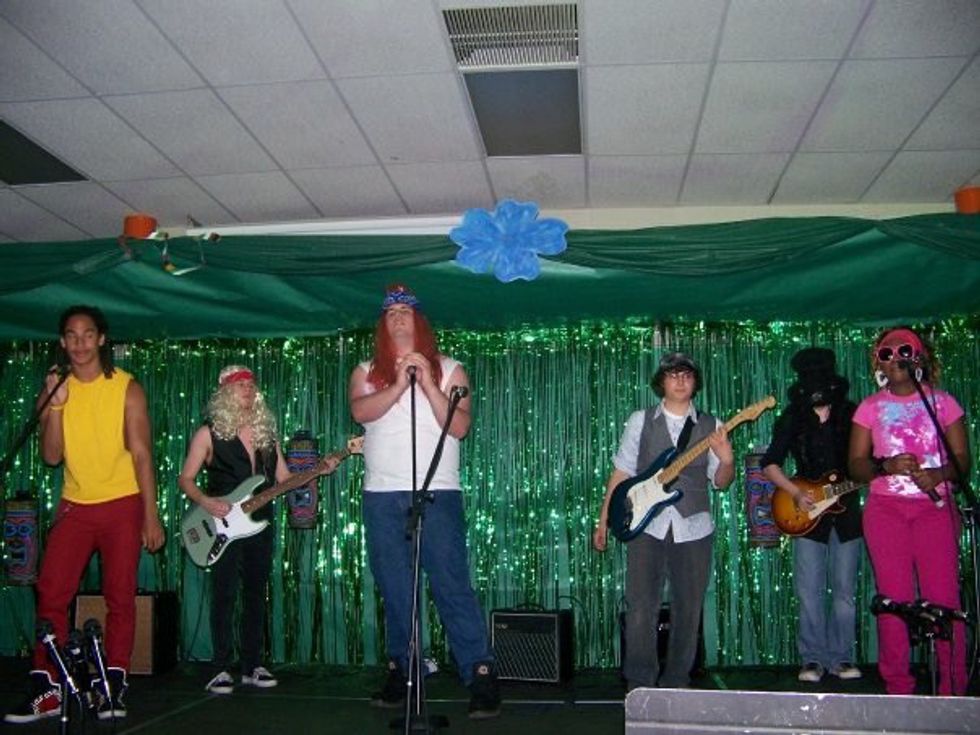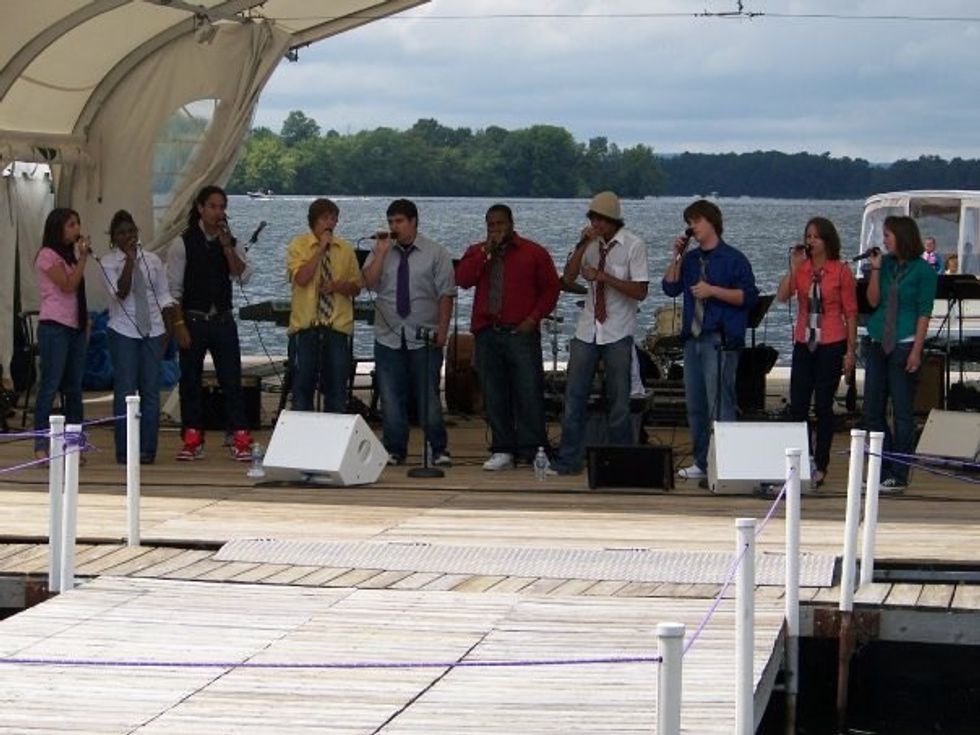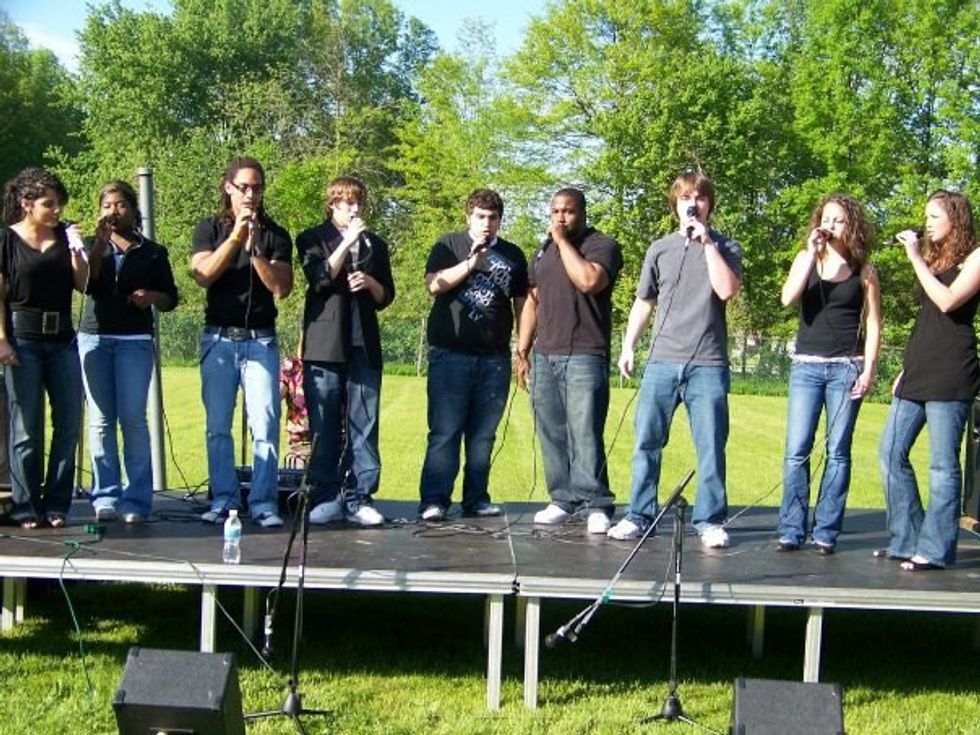Alone in his room he sits and reminisces over his life; the death of his beloved younger brother, the surprise pregnancy and running into constant dilemmas with the law lists only a few of his worries. In his bottomless pit of despair, he bears many meagre options, such as returning to the streets; however, his most recent release from prison defers the idea. Though he debates seeing a shrink, he lacks clear communication skills. The building emotions begin overwhelming his thoughts. Ideas of suicide slowly creep through his mind. As he searches his surroundings, he spots a piano and begins to think about the talents he once possessed in his youth: his ability to sing, the freedom he feels after rapping a meaningful verse, even instrumentally playing from his soul. He weeps, for the joy of liberation from the tumultuous world that suffocates him. With it’s inviting nature, music had unlocked some of his deepest emotions. In that moment he realizes music’s importance in life.
You may be wondering who this mystery person could possibly be. You may realize that this story is too depressing for just one individual. This story would better suffice a collaboration of past and present stars, highly valued in the music business today. Current stars Neyo, Ray Charles, Biggie Smalls and Eminem each experienced the lower end of the spectrum; however, when they embraced music, their lives gained several positive attributes. Some people believe music is unimportant, unessential, but society without the sound of music can be easily compared to a silent movie: boring, unexpressive and a negative mood changer. The quality of life is reduced without music; furthermore, music has the capability of helping individuals with ways of expression, can influence everyday mood, has healing power and life without it, would be just plain boring.
Even with all the great facts and benefits of music that we experience up-close everyday, it just still is not enough! Over the past 10 years, it seems like many inner city school programs have been cut to save money. The programs taking the biggest blows are the physical education, art and music classes. The catastrophe of this misfortune robs our students of opportunities to learn through different mediums. Why cut the music programs when it has been proven that these programs help develop better social skills, leadership qualities and improve academics overall. I can only blame it on ignorance. As a music teacher myself, I think people do not understand what goes on in a music classroom and clearly take the benefits of music for granted.
Plato, the great Greek philosopher, once stated, "Education in music is most sovereign because more than anything else rhythm and harmony find their way to the inmost should and take strongest hold upon it, bringing with them and imparting grade if one is rightly trained." Plato implies that music is the single most important thing a student can be educated in.
While researching the benefits of music education, I looked at the opposite side of the argument to see why people could possibly want to take music from schools. There is insufficient information to support opinions on how music is unfavorable to our student's future and education. However, I found a few good arguments:
Some say that introducing music into the school curriculum too early can cause social division . Doctor Hargreaves from the Cambridge University Press argued against the benefits of music education, "The effects of socio economic status on musical development is fraught with potential problems, especially when viewed in the context of comparable research abilities in general" (1986, The Developmental Psychology of Music). The idea that music can cause social divides indicates that the families who have more money, have more opportunities and are more likely to encourage their children in music. I agree, music can often be an expensive hobby. I graduated from high school with $1500 in school fees. All 100 percent of these fees came from band and choir. I had to pay for reeds, lessons, uniforms and band camp. I almost was not able to graduate high school because my family could not afford to pay fees. Musical instruments cost hundreds of dollars and may not be affordable or accessible to all families. Even in college, I pay sixty dollars a week to my accompanist who performs weekly with me. Music is extremely expensive! Like most artistic hobbies, it is very difficult and rare to be a good musician without some type of training or coaching which is not cheap. However, there are many scholarships for serious music students that pay for private instruction, but this financial help cannot provide for every student. Music causing social divides may not be too far from the truth. Not only is music education costly to families, but also to school districts. Music programs are usually cut due to the lack of funding within the district. However, I believe the solution comes down to society as a whole realizing what is more costly: ignorance or education?
Another argument against music education is that it takes away from the core subjects such as math, reading and writing that students should be focusing on. According to research done at the University of British Columbia, "many argue instructional time that is spent on music courses is ‘wasted,’ because it means that that time is not used for instruction in the academic ‘core subjects, and thus slows down students’ progress in those courses. In direct opposition to this unfortunate, but frequent bias, results imply that music participation benefits students in ways that are directly or indirectly linked to higher academic achievement in general, specifically in regard to mathematics and biology. I believe music education goes hand and hand with some of the basic core classes. According to Gardner's theory of multiple intelligence, there are eight categories of intelligence we human beings have. All eight of these intelligences should be equal. No intelligence should be more important than another. From experience, our current public schools only focus on the logical-mathematical and linguistic areas of intelligence and leave the other six categories to other "special" classes such as music and art. Music is an important piece of education that should be along side math, science and reading as a basic subject. Statistics show that students with music education have had 27 percent higher math scores, 57 points higher on SAT’s and 46 percent higher IQ scores.
From reading through different articles, the good of music education outweighs the bad. Let's not forget, the artists that we know and love began in the seats of a music classroom. Entertainment purposes are just one aspect of the music media. It can be a political tool as well. Songs such as Michael Jackson’s hit single “Man in the Mirror,” made people politically aware of issues concerning the world. To this day, it encourages individuals to first make a change within them before pointing the finger elsewhere. The song also touches upon the repercussions of the Vietnamese War and the cruel assassination of John F. Kennedy. Why are we trying to rid future generations of a key tool that shapes not only education, but society as a whole? The quality of everyday life is reduced without music, but the presence of music makes life meaningful and essential. The negative sides to music education have strengthened my view of the importance of music education. Anything of value is going to cost something. The cost of education is great but the cost of ignorance is greater.























 sunrise
StableDiffusion
sunrise
StableDiffusion
 bonfire friends
StableDiffusion
bonfire friends
StableDiffusion
 sadness
StableDiffusion
sadness
StableDiffusion

 purple skies
StableDiffusion
purple skies
StableDiffusion

 true love
StableDiffusion
true love
StableDiffusion
 My Cheerleader
StableDiffusion
My Cheerleader
StableDiffusion
 womans transformation to happiness and love
StableDiffusion
womans transformation to happiness and love
StableDiffusion
 future life together of adventures
StableDiffusion
future life together of adventures
StableDiffusion





















